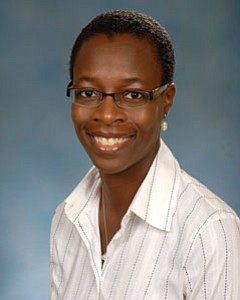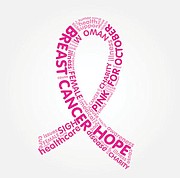Pink ribbons will soon be in bloom to mark October as Breast Cancer Awareness Month. In recognition of this month, here’s some information about breast cancer as well as a few ideas to guide your thoughts and actions during the coming days and weeks.
Breast cancer is the most commonly diagnosed cancer and the second-leading cause of cancer deaths in American women. About one in eight women in the U.S. will develop breast cancer during their lifetime. According to the American Cancer Society (ACS), nationwide in 2017 an estimated 252,710 women will be diagnosed with breast cancer and nearly 40,000 women and 400 men die from breast cancer. Maryland has the sixth highest death rate for breast cancer; the ACS estimates that in 2017, 5,250 women in Maryland will be diagnosed and 820 women will die from the disease.
Courtesy Photo
Breast cancer affects different groups of women in different ways. White women are more likely to be diagnosed with breast cancer than any other racial group; however African-American women are more likely to die from breast cancer than any other racial group. Younger women diagnosed with breast cancer tend to be diagnosed with more aggressive forms of the disease.
In recent years, there have been major developments in the science of breast cancer diagnosis and treatment, which have led to improved outcomes and increased survivorship. There are nearly three million breast cancer survivors in the U.S. today.
Early detection is key! A woman’s chance of surviving breast cancer is increased by early detection. Screening mammography is currently the best available tool for early detection of breast cancer. For most women, screening mammography should start between the ages of 40-50 years old. Women should individually discuss with their doctors the best age to initiate screening and how often screening should be repeated. In addition to regular screening, if a woman notices breast changes such as a lump, swelling, skin changes, pain or nipple discharge, she should see a doctor right away. Though these changes may not mean cancer, a doctor can help determine the cause.
People often wonder about the risks for developing breast cancer. The leading unavoidable risks for breast cancer are: Being female (however, men can get breast cancer too), getting older, race/ethnicity, personal history of breast cancer and family history of breast cancer. Changeable risks for breast cancer include obesity, lack of regular physical activity, smoking cigarettes and consumption of large amounts of alcohol.
Although breast cancer outcomes have improved in recent years, there is room for further improvement especially here in Baltimore. By being informed, encouraged and empowered about breast cancer, you can help make a difference.
Be Informed: Know your individual risk for breast cancer and the behaviors that you can change to decrease your risk. Know your family history and make sure to share this information with your doctor.
Be Encouraged: There are more breast cancer survivors living today than ever in history. Early detection certainly saves lives.
Be Empowered: During the month of October, choose at least one action that you can take towards bettering breast cancer outcomes in our community. Maryland’s highest death rates for African-American women are in Baltimore City and Baltimore County. Here are a few ideas to get you started:
•Lower Your Risk For Breast Cancer— Optimize your health by starting an exercise routine. Consider walking in one of Baltimore’s Breast Cancer Awareness walks this October to get you started. If you smoke, make it a priority to work on quitting, and be mindful of the amount of alcohol you drink.
•Be An Advocate— Advocate for yourself or someone close to you. Talk to your doctor about when you should start screening and if you are due for your mammogram, call and schedule your appointment today. If you are up to date with your screening, check with a daughter, sister, mother, friend, neighbor or co-worker to make sure she is too.
•Make Time For Yourself and Your Health— Whether you are busy taking care of children, have a calendar full of meetings and calls, or are self-employed with limited insurance, you must make time for yourself and your health. If you are overdue to see your doctor, schedule your appointment today.
•If You Need Help, Say Something— If you do not have a regular doctor or health insurance, take advantage of programs such as the University of Maryland Greenebaum Comprehensive Cancer Center’s Baltimore City Cancer Program (BCCP) to get your screening mammogram. BCCP offers no-cost breast cancer screenings to uninsured residents of Baltimore City. BCCP can also help insured individuals who need financial assistance, assistance with scheduling their appointments or transportation for their mammogram. For more information about NO COST mammograms call the Baltimore City Cancer Program at 410-328-HOPE (4673).
Your awareness can lead to conversations and your conversations to actions that improve breast cancer outcomes in Baltimore and beyond. Be informed. Be encouraged. Be empowered.
Dr. Shana O. Ntiri is the Medical
Director, Baltimore City Cancer
Program, Marlene and Stewart Greenebaum Comprehensive
Cancer Center

